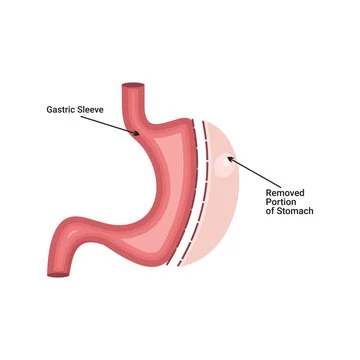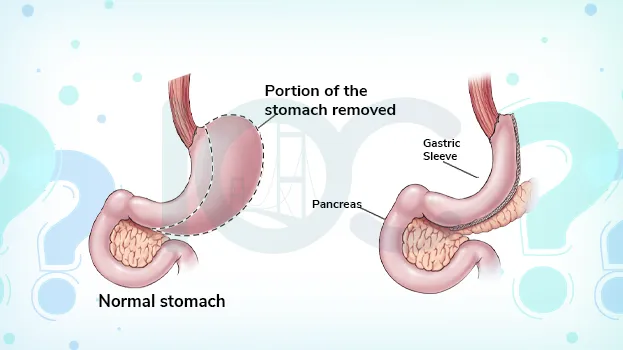When Should You Consider Obesity Surgery? 5 Key Indicators for Changing Your Lifestyle with Weight Loss Surgery:
Obesity surgery, often referred to as bariatric surgery, offers a transformative solution for individuals struggling with severe obesity and its associated health issues. Deciding to undergo weight loss surgery is a significant decision that requires careful consideration. In this blog post, we will explore five critical indicators that can help determine when it is the right time to consider obesity surgery. We will also provide detailed insights into two common types of weight loss surgery—sleeve gastrectomy and gastric bypass—and discuss how changing your lifestyle with weight loss surgery can lead to profound improvements in health and well-being.
What is Obesity Surgery?
When Should You Consider Obesity Surgery? 5 Key Indicators for Changing Your Lifestyle with Weight Loss Surgery:
Obesity surgery encompasses various procedures designed to help individuals achieve substantial weight loss by altering the digestive system. The two most common types of obesity surgery are sleeve gastrectomy and gastric bypass. Each method has its own benefits and is suited to different individuals based on their specific needs and health conditions.
Sleeve Gastrectomy
When Should You Consider Obesity Surgery? 5 Key Indicators for Changing Your Lifestyle with Weight Loss Surgery
Sleeve gastrectomy, also known as vertical sleeve gastrectomy (VSG), involves removing a large portion of the stomach, leaving behind a narrow, tube-like stomach that resembles a sleeve. This procedure significantly reduces stomach capacity, leading to a decreased intake of food and a feeling of fullness with smaller portions.
How Does Sleeve Gastrectomy Work?
- Preoperative Assessment: Before the surgery, patients undergo a thorough evaluation, including a review of medical history, physical exams, and diagnostic tests to ensure they are candidates for the procedure.
- The Procedure: Sleeve gastrectomy is usually performed laparoscopically, which involves making several small incisions in the abdomen. Surgeons use specialized instruments and a camera to guide the operation, removing about 80% of the stomach and reshaping the remaining portion.
- Recovery: Recovery from sleeve gastrectomy typically involves a hospital stay of 1-2 days. Patients gradually transition from a liquid diet to soft foods and eventually solid foods over several weeks.
- Long-Term Outcomes: Patients can expect significant weight loss and improvement in obesity-related conditions such as diabetes, hypertension, and sleep apnea. However, maintaining weight loss requires ongoing commitment to a healthy lifestyle.
Gastric Bypass
What is Gastric Bypass?
When Should You Consider Obesity Surgery? 5 Key Indicators for Changing Your Lifestyle with Weight Loss Surgery
Gastric bypass surgery, also known as Roux-en-Y gastric bypass (RYGB), involves creating a small stomach pouch and rerouting the small intestine to this new pouch. This procedure not only reduces stomach size but also alters the digestive process, leading to reduced calorie and nutrient absorption.
How Does Gastric Bypass Work?
- Preoperative Assessment: Similar to sleeve gastrectomy, patients undergo a comprehensive evaluation to determine their suitability for the procedure. This includes assessing their medical history, current health status, and any potential risks.
- The Procedure: Gastric bypass is performed laparoscopically through small incisions. The surgeon creates a small stomach pouch (about the size of an egg) and connects it directly to the small intestine, bypassing the larger part of the stomach and the first section of the small intestine.
- Recovery: Recovery time for gastric bypass is typically 2-3 days in the hospital. Post-operative care includes a gradual transition from liquids to solids and ongoing monitoring for potential complications.
- Long-Term Outcomes: Gastric bypass often results in significant and sustained weight loss. It also leads to improvements in obesity-related health conditions. Long-term success depends on adherence to dietary recommendations and regular follow-up care.
When Should You Consider Obesity Surgery?
When Should You Consider Obesity Surgery? 5 Key Indicators for Changing Your Lifestyle with Weight Loss Surgery
Deciding to undergo obesity surgery is a personal choice that should be based on various factors. Here are five key indicators that might suggest it’s time to consider weight loss surgery:
1. Inability to Achieve and Maintain Weight Loss Through Diet and Exercise
Why This Matters
If you have consistently struggled to lose weight and maintain it through traditional methods like dieting and exercise, obesity surgery might be a viable option. Weight loss surgery can provide the extra support needed to achieve and sustain significant weight loss.
Changing Your Lifestyle with Weight Loss Surgery
Weight loss surgery can act as a powerful tool to jump-start your weight loss journey. By reducing stomach capacity or altering digestion, these procedures help you achieve a calorie deficit more effectively than diet and exercise alone. This can lead to long-term weight management when combined with lifestyle changes.
2. Presence of Obesity-Related Health Conditions
Why This Matters
Obesity is linked to several serious health conditions, such as type 2 diabetes, hypertension, sleep apnea, and heart disease. If you have been diagnosed with one or more of these conditions and they are not well-managed through conventional treatments, weight loss surgery may offer significant health benefits.
Changing Your Lifestyle with Weight Loss Surgery
Undergoing obesity surgery can lead to substantial improvements in obesity-related health conditions. For instance, many patients experience remission of type 2 diabetes and reduced need for medications after weight loss surgery. The procedure can significantly enhance your overall health and quality of life.
3. Obesity-Related Functional Limitations
Why This Matters
Obesity can cause physical limitations that impact daily activities and overall quality of life. If you find it challenging to perform everyday tasks due to excess weight, surgery might be an appropriate solution.
Changing Your Lifestyle with Weight Loss Surgery
By achieving significant weight loss, you may experience improved mobility and reduced physical limitations. This can lead to a more active and fulfilling lifestyle, allowing you to engage in activities that were previously difficult or impossible.
4. Readiness to Commit to Long-Term Lifestyle Changes
Why This Matters
Obesity surgery is not a quick fix but a tool that requires a commitment to long-term lifestyle changes. Success with weight loss surgery involves adopting healthier eating habits, regular physical activity, and ongoing medical follow-up.
Changing Your Lifestyle with Weight Loss Surgery
Before considering surgery, evaluate your readiness to embrace and maintain the necessary lifestyle changes. Weight loss surgery provides a foundation for weight management, but your commitment to a healthy lifestyle is crucial for achieving and sustaining long-term success.
5. Understanding and Accepting the Risks and Benefits
Why This Matters
Like any surgical procedure, obesity surgery carries potential risks and benefits. It is essential to have a clear understanding of these factors to make an informed decision about undergoing the surgery.
Changing Your Lifestyle with Weight Loss Surgery
When Should You Consider Obesity Surgery? 5 Key Indicators for Changing Your Lifestyle with Weight Loss Surgery
Discussing the risks and benefits with your healthcare provider can help you make a well-informed choice. Understanding what to expect before, during, and after the procedure will prepare you for a successful transition and maximize the benefits of weight loss surgery.
Conclusion
When Should You Consider Obesity Surgery? 5 Key Indicators for Changing Your Lifestyle with Weight Loss Surgery
Deciding to undergo obesity surgery is a significant and personal decision. By recognizing the key indicators for when to consider this type of surgery, you can make an informed choice that aligns with your health goals and lifestyle needs. Sleeve gastrectomy and gastric bypass are two effective weight loss procedures that have evolved over time, offering promising results for those struggling with severe obesity.
Changing your lifestyle with weight loss surgery involves more than just the surgical procedure—it requires a commitment to adopting healthier habits and ongoing care. If you find yourself struggling with weight management, experiencing obesity-related health conditions, or facing physical limitations, obesity surgery may offer a viable path to a healthier and more fulfilling life. Consult with a healthcare provider to explore your options and determine the best course of action for your unique situation.








